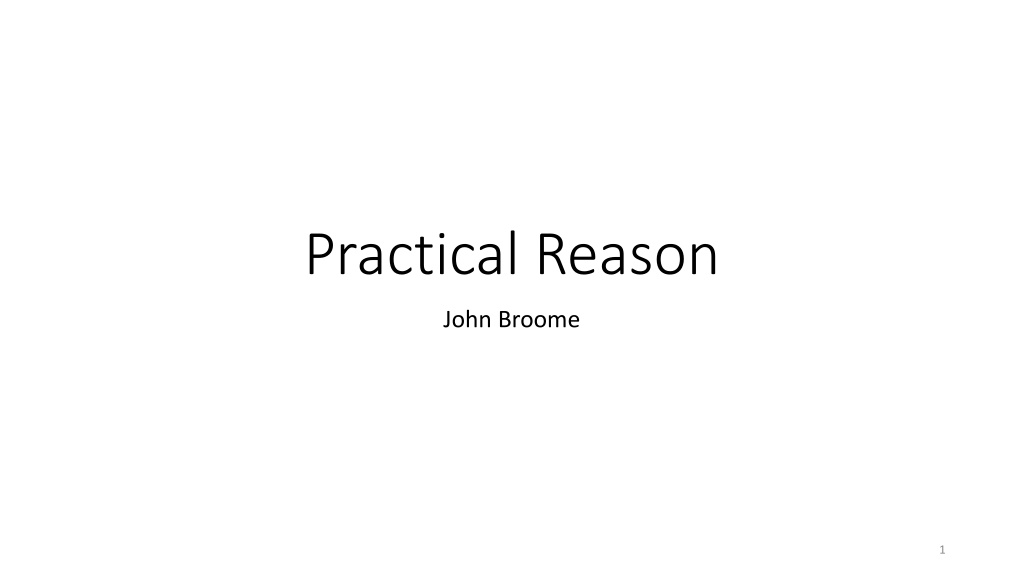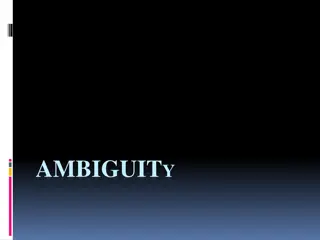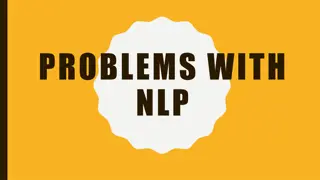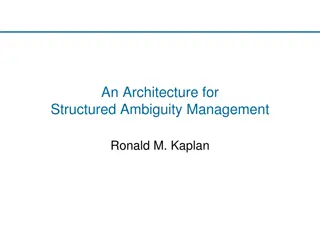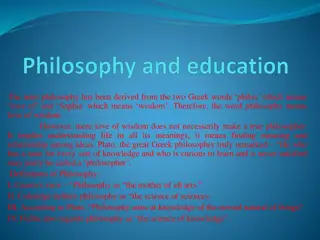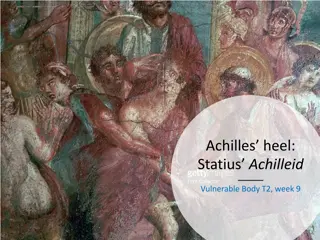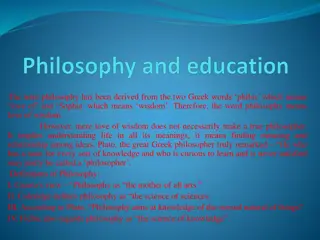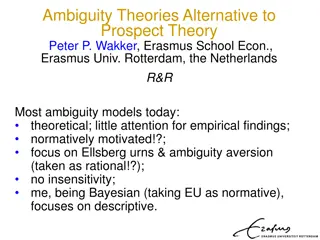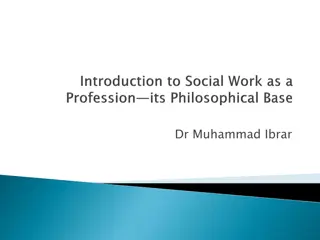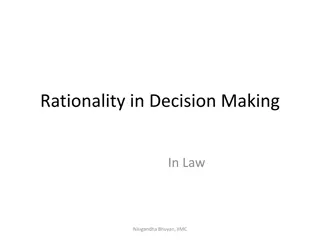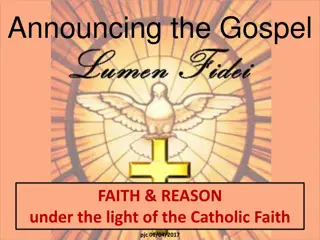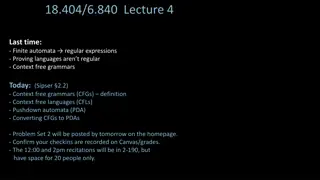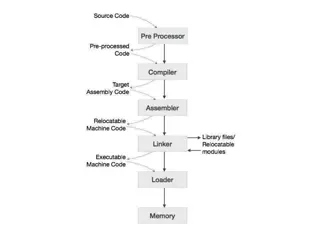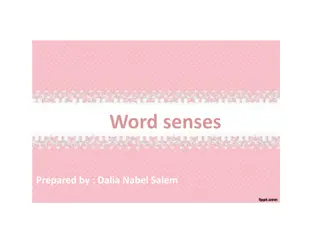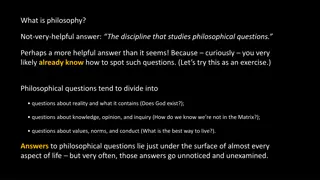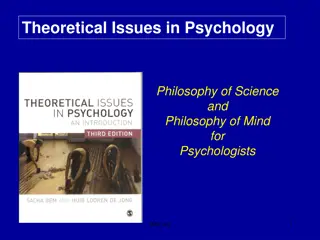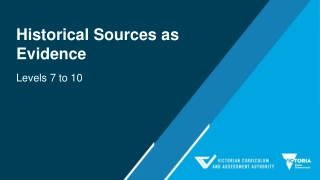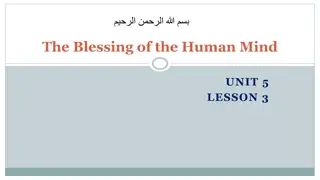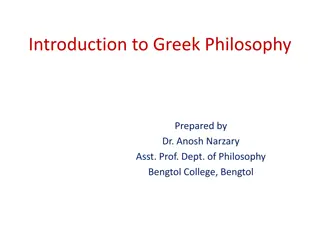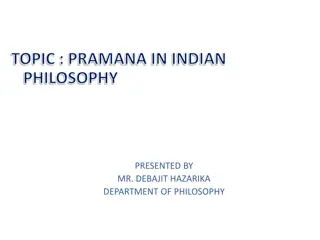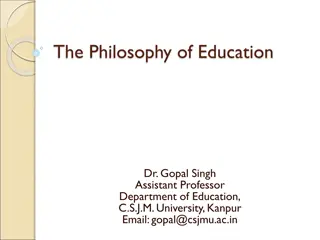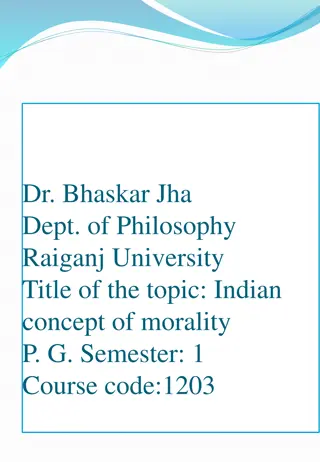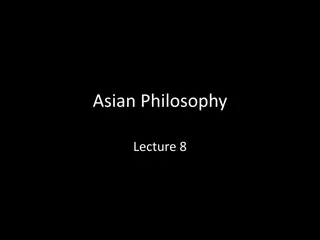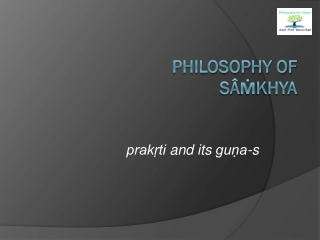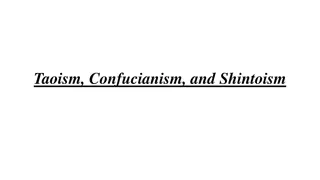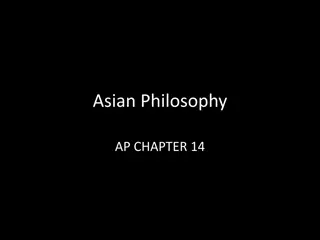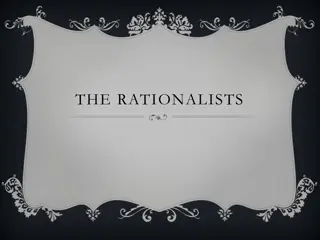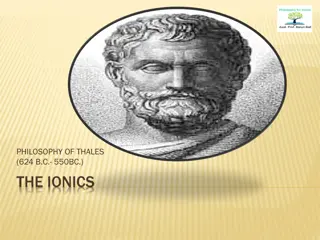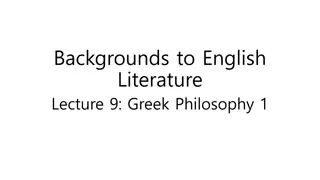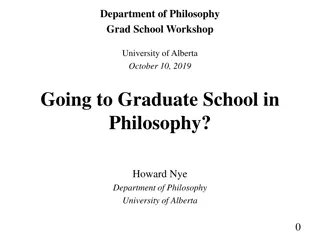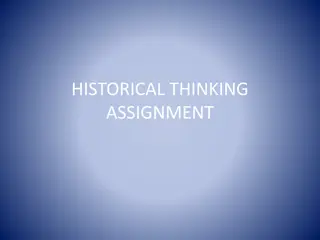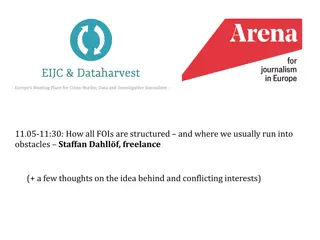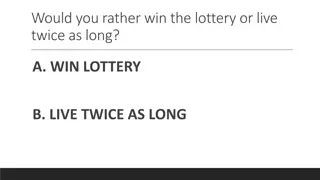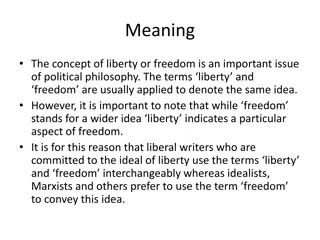Exploring the Ambiguity of Reason in Philosophy Through Historical Perspectives
The ambiguity and complexity surrounding the concept of reason are delved into through the historical lenses of John Broome and David Hume. From the early uses of "reason" in English to its normative implications in moral philosophy, this exploration sheds light on the multifaceted nature of reason in philosophical discourse.
Download Presentation

Please find below an Image/Link to download the presentation.
The content on the website is provided AS IS for your information and personal use only. It may not be sold, licensed, or shared on other websites without obtaining consent from the author. Download presentation by click this link. If you encounter any issues during the download, it is possible that the publisher has removed the file from their server.
E N D
Presentation Transcript
Practical Reason John Broome 1
David Hume, Treatise of Human Nature, Book 2 Part 3 Section 3: Tis not contrary to reason to prefer the destruction of the world to the scratching of my finger. Tis not contrary to reason for me to chuse my total ruin, to prevent the least uneasiness of an Indian or person wholly unknown to me. Tis as little contrary to reason to prefer even my own acknowledg d lesser good to my greater, and have a more ardent affection for the former than the latter. Some philosophers are shocked. Alan Wood says this is silly . Michael Smith says it is grotesque . These philosophers understand Hume to say I can have no reason not to prefer the destruction of the world to the scratching of my finger. (Wood s words) This would be silly or grotesque. But it is not what Hume says nor what he means. Hume had been badly misunderstood. 2
The word reason is ambiguous in many ways. I aim to talk about the nature of what Hume refers to by reason the nature of the thing, that is. This is metaphysics. However, I have to start by talking about the meaning of the word reason . I have to start with semantics in order to clear the way for doing metaphysics. We use language in order to do metaphysics, so we have to be quite clear what our words refer to. This is especially necessary with reason , since it is so ambiguous. The ambiguity appeared in the very first document that used this word in English: Ancrene Riwle (Rule for Anchoresses) (1225). 3
From the Anchrene Riwle: Ihereth nu reisuns hwui me ouh for to fleon thene world: eihte reisuns et te leste. . . . . . The thridde reisun of the worldes fluht is the biyeate of heouene. (Hear now the reasons why one ought to flee the world: eight reasons at the least. . . . The third reason for fleeing the world is the gaining of heaven.) Here reason refers to what we now in philosophy call a normative reason . Normative in moral philosophy means concerned with ought. A normative reason is something that explains (or contributes to explaining) an ought fact. This is the first mention in recorded English of a normative reason, at least the first that uses the word reason . 4
Here, reason is a count noun it refers to denumerable things, so it has a plural. But Hume is not using the count noun. So what does his reason mean? There are two possibilities. Count nouns often have corresponding mass nouns, which refer to a mass or stuff. For instance the count noun a light is associated with the mass noun light . In English, a reason is associated with the mass noun reason . But the Oxford English Dictionary contains no clear instances of it before Shakespeare (1590): Midsummer Night s Dream Me thinkes . . . you should haue little reason for that. Henry VI part 2 There s reason he should be displeased at it. The mass noun reason here is normative. 5
The noncount nount reason may alternatively refer to a property of people, often called a faculty. From the Ancrene Riwle again: Wummon is the reisun thet is, wittes skile hwon hit unstrenctheth The woman is the reason that is, understanding when it weakens Here reason is used to refer to the property or faculty. Later examples: Shakespeare (Midsummer Night s Dream), 1590: The will of man is by his reason sway d. Hume (Treatise), 1739: Reason alone can never be a motive to any action of the will 6
The corresponding adjective, which ascribes the property of reason to someone is rational (first occurrence in OED 1398). From this is derived the noun rationality (first occurrence in OED 1628) as a name of this property. This property already had the name reason . So rationality means the same as reason in a particular sense, which I call the rational sense. Rationality is often the preferable word, to avoid some of the ambiguity of reason . Also, rationality is commonly ascribed to other things besides people, such as acts, beliefs, train timetables and so on. These are derivative cases. For instance, a rational act is one that a rational person might do. 7
The property of reason is often reified to a degree, which means it is treated as an entity outside the person. For instance, Shakespeare (Midsummer Night s Dream), 1590: The will of man is by his reason sway d, and reason saies you are the worthier Maide. This goes even beyond reification to personification. In philosophy, we often reify rationality in such remarks as Rationality requires you not to have contradictory beliefs Here rationality is treated as an external entity that prescribes things to us. 8
Tis not contrary to reason to prefer the destruction of the world to the scratching of my finger. Wood and Smith assume Hume is using reason as a mass noun in its normative sense, so he means I can have no reason not to prefer the destruction of the world to the scratching of my finger. But Hume is not that silly. Once we recognize the ambiguity, it becomes obvious that he is referring to the property of reason or rationality. He means Preferring the destruction of the world to the scratching of my finger is consistent with my being rational. This is not silly. It is questionable, but in an interesting way. Having clarified the meaning of the claim, I now go on to question it. 9
It is indeed Humes professed view that rationality has nothing directly to do with practical matters. Treatise Book 3 Part 1 section 1: Reason is the discovery of truth or falsehood. From this he deduces (Book 2, Part 3 Section 3): Reason alone can never be a motive to any action of the will. This is why he thinks you may have any preference at all a practical matter without getting into conflict with rationality. So to Hume, the title of my talk, Practical reason , is an oxymoron. 10
A contrary view: Aristotle wrote of practical syllogisms as roughly parallel to theoretical syllogisms such as this one: All men are mortal Socrates is a man So: Socrates is mortal Aristotle thought of a syllogism as a process of reasoning, and he thought that the conclusion of the process of a practical syllogism is an act. Nicomachean Ethics, Book 7 Chapter 3 (Penguin translation): As in [the theoretical syllogism] the mind is forced to affirm the conclusion, so in the practical syllogism we are forced straightway to do it. Suppose you have these premises: All sweet things ought to be tasted and That thing is sweet When these premises are brought into relation you are bound, if nothing prevents you and you can do it, to go and taste the thing. 11
Aristotle thought a process of reasoning could conclude in an act. Reasoning is an application of the faculty of reason rationality so he evidently believed there is something that may be called practical reason or practical rationality . We should distinguish practical reason, a faculty or property of a person, from practical reasoning, a process that a person can go through. I start with rationality, which can be described by presenting requirements of rationality. For instance, this is a feature of theoretical not practical rationality. Rationality requires you not to have contradictory beliefs. 12
Practical requirements of rationality: The Instrumental Requirement.Rationality requires you to intend whatever you believe is a means implied by an end that you intend. This is a requirement on intention rather than action. Despite what Aristotle suggests, there cannot be rational requirements on acts, because your rationality depends on the state of your mind only. Hume does not accept this requirement. He thinks that people generally do intend means to ends they intend, but this is just a contingent feature of their psychology. But many philosophers who are these days known as Humeans do accept it. Common sense is on their side. I shall not dwell on this requirement; I take it for granted. 13
Enkrasia. Rationality requires you to intend to do whatever you believe you ought to do. This is more controversial. Aristotle s example shows he accepted it. Failing to intend to do what you believe you ought to do has been known since ancient times as akrasia , and traditionally it has been regarded as irrational. Akrasia is plainly some sort of a failing, and it s hard to know what sort if it s not a rational failing. It s not a moral failing, for instance, because it is not necessarily morality that determines what you ought to do. Let us tentatively accept this requirement too. 14
Now we have some idea of practical rationality, we need to go further. We can classify people into the rational ones and the irrational ones. Call them the sheep and the goats . It would be very disappointing if we could classify people as sheep or goats but not identify a way for goats to become more like sheep. Indeed, it would be disappointing if we could not identify a way in which people could make themselves more like sheep. We would be stuck with a sort of rational Calvinism. Can we identify a way? 15
This question has a particular poignancy when asked about enkrasia. The goats include akratic people, who believe they ought to do something but don t intend to. For instance, you can imagine a person who believes she ought to back up her hard drive once a week, but is too lazy to intend to do so. A means for making yourself sheep-like would be a means of overcoming akrasia. Is that possible? Some Humeans think not. They think that a mere belief could not motivate the will as they put it. Merely believing you ought to do something cannot motivate you to do it. (And intending to do something is a sort of motivation to do it.) Is there an answer to this view? 16
Many of us are fairly rational automatically, by our nature. But I believe we also have a way to improve our rationality, and that is by reasoning. Reasoning is a mental activity, by means of which we can bring ourselves to satisfy requirements of rationality that otherwise we would not satisfy. Theoretical reasoning can bring us to believe the implications of things we believe. Practical reasoning can bring us to satisfy practical requirements of rationality. 17
For instance, you might say to yourself: It s nearly ten o clock The mail is delivered about ten o clock So the mail will be delivered soon The first two sentences express your initial beliefs; the last one expresses a new belief you acquire during the reasoning process. This is a plausible example of theoretical reasoning. 18
And you might say to yourself: I m going to Rome next month To get to Rome I need to buy a ticket So I ll but a ticket The first sentences expresses an intention you initially have; the second expresses a belief you initially have; the last sentence expresses a new intention you acquire during the reasoning process. This is a plausible example of practical reasoning. 19
And I think there is enkratic reasoning that brings you to satisfy enkrasia. You say to yourself: I ought to go to bed now. So I ll go to bed now. But all this is just a claim. To make good this claim requires a lot of work. I need to give a full account of reasoning, which shows in particular that it is an act of yours: something you do. This will start with an account of theoretical reasoning because that is easier to understand. It will extend to practical reasoning, and eventually to enkratic reasoning. This is the task of my book Rationality Through Reasoning. 20
THE END 21
